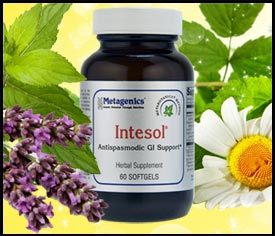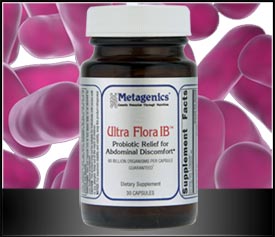
Treating Irritable Bowel Syndrome (IBS) Naturally!
Overview
Irritable Bowel Syndrome, (IBS), is a gastrointestinal, (GI), disorder that affects approximately 20% of the U.S. population. Scientists believe this figure is much higher given their collective estimate that less than 50% of people with this disorder actually seek the help of a doctor.
Gastrointestinal (GI) disorders are the most common cause of absenteeism in the workplace. According to BadGut.org, at least one third of IBS employees miss an average of one day of work per month due to their IBS symptoms. It has been reported, via various surveys, that IBS symptoms are responsible for a 15-21% greater loss in work productivity.
Symptoms of IBS include:
- abdominal pain
- bloating
- changes in consistency and/or frequency of stools, (i.e., diarrhea/constipation)
- cramping
- fatigue, and
- bad taste in mouth
Symptoms tend to occur after eating, during times of stress, and with women, during PMS.
Back to Top
What Causes IBS?
There is no cure for IBS. However, research to date has been able to pinpoint several interacting factors that contribute to the development of IBS. Therefore addressing these factors may be the best way to control IBS. The most significant factor is disturbed GI motility.
Disturbed GI motility refers to abnormal intestinal contractions, such as spasms. This phrase is used to describe a variety of disorders in which the gut has lost its ability to coordinate muscular activity because of internal or external causes. There are a variety of motility disorders that can affect the GI tract from functioning properly. From the esophagus to the rectum, each part of the GI has a unique function to perform in digestion, and each has a distinct type of motility and sensations. When motility and sensations are not appropriate for performing specific functions, illness occurs.
According to Barbara Bradley Bolen, Ph.D., author of Breaking the Bonds of Irritable Bowel Syndrome, “Colon contractions are too fast in people with diarrhea-predominant IBS (IBS-D) and too slow in people with constipation-predominant IBS (IBS-C).” Moreover she lists a variety of common factors that create disturbed GI motility, whether you have IBS or not. They are:
- Diet
- Stress, and
- Hormonal changes
According to recent research, another main trigger includes:
- Altered intestinal microflora
Back to Top
Suggested Protocol
Following are some steps you can take to help alleviate the symptoms associated with IBS .
Diet: Includes dietary adjustments (such as the avoidance of “trigger foods”). Trigger foods can be determined via an elimination diet, as well as from a list of commonly known foods that are known to exacerbate symptoms in those suffering with IBS. It is recommended that you keep a daily diary of the foods you eat and note whether you experience any IBS-like symptoms – listed above. Also, eliminate trigger foods which include: gluten (wheat, rye, barley), alcohol, caffeine, carbonated beverages, dairy products, gas-producing foods (such as beans, cabbage and broccoli), eggs, peanuts, shellfish, and foods high in sugar.
CLICK HERE for a comprehensive Elimination Diet Guide.
Stress: According to the U.S. Department of Health and Human Services, stress can stimulate colon spasms in people with IBS. The colon has many nerves that connect it to the brain. Like the heart and the lungs, the colon is partly controlled by the autonomic nervous system, which responds to stress. These nerves control the normal contractions of the colon and cause abdominal discomfort at stressful times. People often experience cramps or “butterflies” when they are nervous or upset. In people with IBS, the colon can be overly responsive to even slight conflict or stress. Stress makes the mind more aware of the sensations that arise in the colon, making the person perceive these sensations as unpleasant.
Some evidence suggests that IBS is affected by the immune system, which fights infection in the body. The immune system is affected by stress. For all these reasons, stress management is an important part of treatment for IBS. Stress management options include:
- stress reduction training and relaxation therapies such as meditation
- counseling and support
- regular exercise such as walking or yoga
- changes to the stressful situations in a person’s life
- adequate sleep
Hormonal changes: Marcelle Pick, OB/GYN NP states, “Lots of women notice that their IBS symptoms are worst just before their periods. Why this occurs is not clear, but it may have to do with the pattern of hormonal fluctuation in the second half of the cycle: estrogen is lower for several days, whereas progesterone is relatively high at the end of the cycle, then drops off suddenly just before menses. Progesterone in general slows gut motility, and lower-than-normal estrogen levels have been identified in women with IBS. It’s possible that when the ratio between these two sex hormones is off, sluggish bowels could in turn worsen pelvic congestion, cramping, and abdominal distention.”
Altered intestinal microflora: There is evidence to suggest that intestinal microflora is altered in those diagnosed with IBS compared to non-affected persons. Given this common “indicator” of IBS, researchers and clinicians alike began evaluating the effectiveness of supplementation with probiotics: in the form of Lactobacillus Acidophilus
Many clinical analysis, and studies have focused on probiotic therapy for IBS with end results being more than promising. At the end of one of these studies, it was reported that significant improvement in symptoms and quality of life from baseline with probiotic therapy, had been noted. In other studies, relief from the symptom of bloating alone, were at minimally observed.
Lactobacillus acidophilus is considered friendly bacteria that live in our digestive system. Friendly bacteria help to counter the bad bacteria that if unchecked, can cause illness. Used to treat and prevent diarrhea, including infectious types such as rotaviral diarrhea in children and traveler's diarrhea, lactobacillus acidophilus is also used to prevent and treat diarrhea associated with using antibiotics.
Back to Top
More Help for IBS -
There are other natural treatment options that can provide significant relief of IBS symptoms. These include the herbs – peppermint & chamomile. Furthermore, because of the significant role that stress appears to play in the pathophysiology of IBS, herbs such as lavender and lemon balm are recommended for their ability to reduce stress and promote relaxation.
Peppermint has been used for centuries as a digestive aid. It has been shown to relax intestinal smooth muscle in animals and humans by interfering with the availability of the calcium required for contraction by acting as a calcium channel blocker. The relaxation effect of peppermint oil is so pronounced that it is used during colonoscopy and barium enema exams for its ability to reduce colonic spasms.
A study published in the Journal of Gastroenterology in 1997 found that IBS patients taking peppermint-oil capsules for symptom relief experienced an approximately 40% greater reduction in abdominal pain and a 50% greater reduction in bloating and flatulence than those patients receiving a placebo. Many studies since have confirmed the results!
Chamomile has become so popular in its effect on IBS symptoms, that the herb was worthy of honorable mention in a Reader’s Digest article entitled “Stomach Soothers”:
“Chamomile, considered to be one of the safest medicinal herbs, is frequently recommended as a gentle treatment for common gastrointestinal problems. In Germany, where herbalism has long been considered conventional, tradition holds chamomile to be so useful that it has been dubbed alles zutraut, or “capable of anything.” Indeed, for gastrointestinal ailments, it’s somewhat of a superherb. Antispasmodic, anti-inflammatory, and carminative, (i.e., prevents formation of gas in the gastrointestinal tract, as well as facilitates the expulsion of gas, thereby combatting flatulence), chamomile can act upon the digestive system in a number of healing ways. It relieves flatulence and heartburn by mildly sedating and soothing the mucous membrane of the digestive tract. Its natural sedative properties can also relax the entire body, which may help if your digestive discomfort is caused by stress or worry.”
Lavender Oil can help relieve stress, depression and more. There’s a reason it’s used in so many bath salts, body lotions and massage oils. The fragrance of this flower is just plain relaxing—and scientific studies prove it. Florida researchers have found that lavender oil reduces anxiety and lowers pulse rates in nursing students taking stressful tests. And in hospital settings, lavender aromatherapy has been demonstrated to decrease pre-surgery distress and to be more relaxing than massage or merely resting.
Back to Top
Our Top Supplement Recommendations for IBS |
|
|
| |
Intesol by Metagenics
Intesol features herbs clinically noted for their antispasmodic and carminative effects. Read more ... |
|
|
Ultra Flora IB by Metagenics
Ultra Flora IB is an enhanced potent probiotic formula designed to help relieve bowel irritation. Read more ... |
|
|
Please let us know if this article helped.
References
- Clinical Summary: Evaluation of Nutritional Support with Lactobacillus acidophilus NCFM® and Bifidobacterium lactis BI-07 in Patients with Irritable Bowel Syndrome (IBS): Summary of Clinical Experience
- Faber SM. Irritable bowel syndrome and reinoculation with probiotics. Am J Gastroenterol. 2002;97:211. [Poster #336]
- Irritable Bowel Syndrome (IBS) Health Center Controlling Symptoms with Diet WebMD
- Irritable Bowel Syndrome U.S. Department of Health and Human Services National Digestive Diseases Information Clearing house. A service of the National Institute of Diabetes and Digestive and Kidney Diseases (NIDDK), National Institutes of Health (NIH)
- Marcelle Pick, OB/GYN NP Digestion & GI Health Women to Women
- Hills JM, Aaronson PI. The mechanism of action of peppermint oil on gastrointestinal smooth muscle. Gastroenterology
- James Rouse, ND Nutritional Management of Irritable Bowel Syndrome, Advanced Nutrition Publications, Inc. Metadocs
- Onderko, P. Stomach Soothers, A User Friendly Guide to Herbs That Can Settle Your Tummy, Reader’s Digest
Back to Top |











